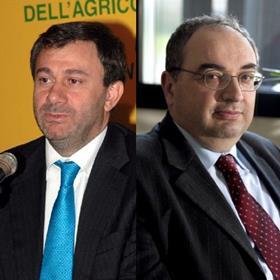
One of Italy's leading fresh produce suppliers, Conserve Italia, which markets a range of processed fruit and vegetable products on behalf of its member growers, has become embroiled in an unseemly war of words with Italian farming organisation Coldiretti over the apparent absence of Italian oranges in juice sold by the cooperative.
Sergio Marini, president of Coldiretti, came out fighting on Thursday (25 March) after statements made by the president of Italy's cooperatives federation Confcooperative Luigi Marino – in which he suggested that Mr Marini had attempted to distract attention from his own organisation's alleged failure to assist Italian farmers – left a bitter taste in the mouth.
His chosen target for retribution was Maurizio Gardini, president of both Conserve Italia and agricultural cooperatives association Fedagri, who he accused of colluding with Luigi Marino to hide what he claimed to be the truth about the real impact of imported fresh produce on the country's own growers.
'It remains a fact that one of them should tell the Italian people what and how much fruit is bought overseas by the cooperative group Conserve Italia,' he said, 'starting, for example, with the juice it makes from oranges, which in Italy remain on the tree because they cannot get a good price.'
He continued: 'And while we're on the subject, perhaps he could also tell us about all that fruit which is not only bought but also processed at the group's factories in France and Spain, while in our country growers are digging up their trees.'
Mr Marini argued Conserve Italia had contributed to recent poor results for Italian growers, many of whom have seen their returns fall sharply in recent years.
Figures released by Istat last week revealed that Italy's overall spending on fresh produce imports rose 8.4 per cent year-on-year to €2.57bn during 2009, while the volume of imported goods was up 11.2 per cent compared with the previous year at 3.23m tonnes.
Significantly, citrus import volumes rose 37.9 per cent to 423,000 tonnes in 2009, while sales were 16.5 per cent higher at €271.5m.
Mr Marini's anger was evident: 'If things are going bad for agriculture then it's because today, as in the past, we have entrusted the economic value of our products to certain cooperatives who have been good at bagging themselves a boat-load of public funding while leaving growers not only to sell their products at the side of the road, as Gardini himself puts it – and they're the only ones, by the way, who are making any money – but literally starving in the middle of the road.'
Referring to Luigi Marino's comments, he added: 'Even if someone of a higher rank says it, a lie is still a lie. I realise this may offend, but these people need to be told in no uncertain terms that the time for messing around has long since passed. I could go on and spend more time giving further details, but for now the controversy does not warrant further attention.'
Pithy response
However, Mr Marini's comments have attracted a good deal of attention in the Italian press, not to mention at the headquarters of Conserve Italia in San Lazzaro di Savena, near Bologna.
Labelling the comments as 'unusual, agressive and misleading', the group said in a statement that its mission remained to maximise the value of the fruit and vegetables produced by its Italian 16,000 members, who supply more than 90 per cent of the raw materials it processed during 2009.
The statement also pointed out that, last year, Conserve Italia processed a total of 376,000 tonnes of 100 per cent Italian tomatoes, 93,100 tonnes of peaches, pears, apples and apricots – all 100 per cent Italian, and 77,200 tonnes of sweetcorn, chickpeas, peas, green beans and Borlotti beans, again all Italian.
 'Orange juice, which is worth just 0.3 per cent of Conserve Italia's combined turnover, certainly doesn't represent the cooperative's core business,' the group insisted.
'Orange juice, which is worth just 0.3 per cent of Conserve Italia's combined turnover, certainly doesn't represent the cooperative's core business,' the group insisted.
'These accurate and verifiable figures confirm Conserve Italia's absolute leadership on the national market, and what's more the prices of the products it sells are always higher than the market average and, in certain cases, they are the reference for the entire Italian market,' the statement continued.
'In rejecting the misleading and childish argument about oranges, Conserve Italia recalls that this fruit does not fall into the basket of products grown by its members, for whom the cooperative has to guarantee an appropriate return. We ask President Marini to inform himself better and not to blame others for things which he, and the organisation over which he presides, are responsible.
'In closing this note, Conserve Italia hopes that tomorrow Marini and Coldiretti won't ask where we buy our pineapples…'
Bitter recriminations
Conserve Italia subsequently extended an invitation to Mr Marini to visit its eight facilities in Italy and to see first-hand the work done by the cooperative on behalf of its member owners.
But the response from Coldiretti's president was blunt and to the point: 'We don't need to visit (the group's Italian factories),' Mr Marini countered. 'We know them well, given that they have been built and supported in large part by public money from the Italian agricultural sector.'
Admitting the need to draw the argument to a close, Mr Marini seemingly could not resist another swipe at the cooperative.
'Like the president of Fedagri, Mr Gardini, I too think it's right to end the argument here, but in the meantime it's right for the sake of correct information to understand that Italian citrus remains on the trees because Conserve Italia buys it abroad,' he said. 'By the way, where do you buy it? We look forward to hearing where the product comes from and what Conserve Italia's facilities in France and Spain are processing.'



